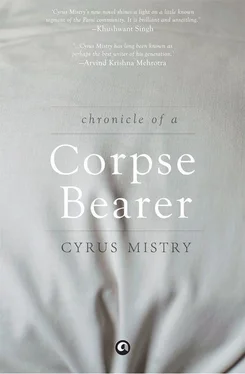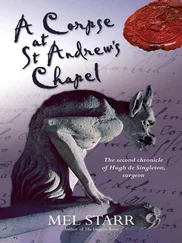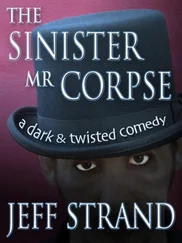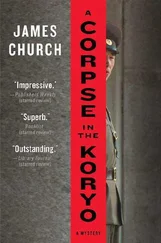This was going to be a long and tedious trudge, we all knew, even though we were taking the straightest possible route — past Flora Fountain and Dhobi Talao, through Girgaum and Hughes Road, then on to the Towers. Once, under the sun, I stumbled, nearly losing my grip on the bier.
I had had nothing to eat since last night. Just before leaving the house in Cusrow Baag, kindly neighbours of the bereaved family had handed us an earthen pot of fermented toddy — tart as hell, but I drank thirstily, my mouth was parched — and brown lumps of sweet jaggery tucked into rounds of soft white bread; sustenance for the long walk back.
For a while, the weight of the bier and corpse seemed entirely manageable. In fact there was a spring in our step. On certain streets, which were practically deserted, remembering Buchia’s admonition about the next funeral having to start at four o’clock, we raised the tempo and jogged. There, Rusi’s sporadic, breathless bellow actually helped us find our rhythm, but we couldn’t keep up that pace for long.
‘Let’s slow down a bit,’ gasped Boman.
‘Slow down, of course, slow down. .’ seconded Rusi, wheezing and heaving, ‘we’ll make it back in time, not to worry.’
But it was already half past two. We had lost a lot of time almost at the start of our return journey when we were held up by a commotion in the street caused by a large group of rowdy nationalists, who were yelling anti-imperialist and pro-Swadeshi slogans outside an emporium for clothes near the Army and Navy Stores. It was a place called Crawford and Allen: Importers of Fine Apparel . The protestors were taking exception to the dress shirts, jackets, jodhpurs, derbys or whatever was contained in a large number of parcels a wealthy man and his wife had just walked out of the shop with; browbeating them to show allegiance to the cause of India’s independence by consigning every last parcel in their arms to a large bonfire blazing on the macadamized public road.
Traffic had slowed down, there was smoke everywhere. Several Anglo-Indian officers in white stood by, glowering under their sola topees, none too pleased with the sweltering summer heat, smoke, fire and the sloganeering of nationalists. The protesters were cordoned off from the general public by a posse of Indian sepoys. Then something happened, what it was I didn’t see.
Perhaps somebody threw a stone. The officers barked a directive, and immediately a fracas ensued. The sepoys, in their baggy blue shorts, began caning the vociferous protestors. Many were arrested, and bundled into a waiting police van. Moti was barking her head off. Finally, one of the officers noticed us waiting patiently with a corpse and dog, and gave instructions to let us pass.
A Parsi funeral must be concluded before sunset. In Parsi-populated areas there was certainly no call for vocal histrionics. The sight of four burly men in white muslins, shouldering a corpse on a bier and walking as fast as they could was self-explanatory: the public knew where we were headed, and why in such a hurry. People made way for us long before we approached. Jungoo, the erstwhile driver of the defunct hearse, was walking a little ahead of us, holding on tight to the excitable Moti’s leash. It was he, really, who should have been clearing a path for us, admonishing pedestrians that a corpse was on its way. But, that very morning, he had complained of a sore throat; as always, Rustom was happy to take on the part of crier, boastfully revelling in the reverberations of his own deep voice.
‘Make way! Make way for the corpse. .’
Nobody quite remembers how the custom of showing a corpse to a dog began, but it’s probably as old as ancient Persia itself. Before modern medicine reserved that right for itself, it was canines that were believed to have an uncanny ability to sniff out the slightest flicker of vitality persisting in a body presumed dead. Hence, not once, but thrice in the course of the funerary ceremonies my Moti is brought before the corpse. Invariably though, after no more than a moment’s hesitation, she wrinkles her snout and looks away.
By the time we reached Opera House, obstructions in our route had increased manifold: all manner of traffic, crowds of people on foot, bullock carts, stray cows, taxis, public trams rattling past, and every now and then, a chauffeur-driven private sedan honking obstreperously. The voices of street hawkers rang in our ears through several long stretches during our journey.
‘Fresh leafy vegetables. .fresh methi, sua, maat. .’
‘Bombeel. .taaji, safed bombeel!’
‘Langraa. .langraa. .dasheree. Juicy, sweet dasheree. .’
Given the fierceness with which the sun was beating down, it was unlikely that either the leafies or the Bombay duck had retained any of their proclaimed freshness. The mangoes looked quite luscious, though. It was already a quarter to four, and I was terribly thirsty.
‘Shall we take the short cut through Khareghat Colony?’ asked Jungoo.
‘Hardly much shorter,’ snapped Rusi. ‘And taking those steep rocky shelves with a corpse’ll slow us down even more.’
Clearly, he was peeved, for not once had Jungoo offered to relieve him of his load. Not a corpse bearer himself, Jungoo was no stranger to nusso either; his own elder brother had been shouldering corpses for years. And Jungoo would have known just how difficult it is for the same person to yell for gangway while carrying the weight of a corpse and bier.
Having made it up to Kemps Corner and almost into the gates of the funeral grounds, something happened to me which I can’t quite account for, even after all these years. It’s never happened before, or since.
Fatigue, dehydration and exhaustion — all that, yes, but something else, too: for I went under at the very junction where one road bifurcates to Forjett Hill — towards the small fire temple where I grew up. Even on a normal day, if in the course of my work I happen to casually pass by the lane that leads to my father’s temple, the emotions that surge in me can be quite disordering. This time, however, I simply passed out.
Not in an instant, as with the flick of a switch, but rather gradually. .my legs turning to jelly and folding in, even as I heard clearly the agitated voices of my fellow-shoulderers.
‘Oh my God, watch out!’
‘What’re you doing, ghair chodiya! The bier! Hold on!’
‘Help, someone. .Elchi’s collapsed.’
As I crumpled to the ground — all this was reported to me only later — the corpse slid off the bier and turned turtle, causing a great uproar and commotion among passers-by. For me, the only odd impression which I still retain is that it wasn’t a gradual tunnelling into darkness; rather, I felt overwhelmed by the intense, dazzling heat of an inferno — a fierce, blinding white light — that drew me to it relentlessly and then, at the very last moment when I felt I should be consumed by it, repelled me violently: plunging me into complete darkness.
And all through this vertiginous delirium, but one bleak and sorrowful awareness held me in thrall: the white marbled spotlessness of the fire temple where I had spent some of the happiest years of my life, and the all-pervading presence in it of my father, its head priest, who, in the last many years, had refused to speak to me, or even set eyes on me. When I came to, minutes later, I felt immense bereavement. All that immaculate purity and holiness was out of bounds for me. Everything I had once held dear was lost, and forever, I had become a pariah. .
My earliest memories are aural: a burst of startling thunder, the thrumming of torrential rain. Early evening, but already rather dark, a storm is raging outside.
Father has just woken up from his afternoon nap. While Mother puts the kettle on for his tea, he carries me in his arms, strolling idly, but at the same time gripping me with what seems like excessive caution. He carries me through the cool, shadowy back rooms of the temple, and into the dry, thatched arbour of the open-air well. When he stops by the well to peer in, Father clutches me even more tightly. I squirm in his arms, lean forward and drink in a glimpse of its deep, dark emptiness.
Читать дальше












